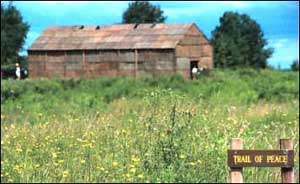















Successes in Stewardship: October 2005 |
|---|

|
Federal Highway Administration
October 2005
Improving Section 106 Compliance by Improving Relationships: FHWA Tribal Consultation Workshops

The Federal government's relationship with Indian tribes is deeply rooted in American history, dating to the earliest contact between colonial and tribal governments. Like the colonial powers, the United States acknowledges Indian tribes as sovereign nations; this relationship exists on a government-to-government basis. Accordingly, many different laws, regulations, Executive Orders, and Federal policies direct the U.S. Department of Transportation's (USDOT) responsibilities toward Indian tribes. In particular, Section 106 of the National Historic Preservation Act (NHPA) requires that the USDOT, like all Federal agencies, consult with Indian tribes, Native Alaskans, and Native Hawaiians if the agency's undertakings may affect tribal properties or properties with traditional religious and cultural significance to the tribes. These properties may be on or off actual tribal lands, yet still require consultation. Consulting with tribes requires a basic understanding of U.S. — tribal relationships, specific knowledge of what is required by law and regulation, and awareness of what is culturally appropriate. This series of four workshops provides an opportunity for representatives of transportation agencies and tribes alike to navigate the complexities of Section 106.
In order to ensure meaningful and timely tribal consultation, the Advisory Council on Historic Preservation (ACHP) is working with the Office of the Secretary of Transportation (OST) and the Federal Highway Administration (FHWA) to present the FHWA Tribal Consultation Workshops. ACHP, as the agency promulgating and overseeing implementation of the regulations governing consultation under Section 106, is particularly suited to provide expert advice to FHWA and its sister agencies. These two-and-a-half-day workshops provide a venue where State DOT and FHWA officials can meet with members of Indian tribes to discuss Section 106 and other related topics. While some State DOTs and FHWA Division Offices have developed relationships with relevant tribes, many others are just beginning to do so. At the workshops, all parties have the opportunity to foster relationships as well as obtain guidance on consultation. In addition, the workshops present an opportunity to share experiences with other DOT agencies and their state partners in the same region on how to best initiate and approach tribal consultation. Each workshop is designed to:
To date, three regional workshops have been held, and one more is planned for late October 2005. Participants include representatives from tribes located within each host region, as well as FHWA, Federal Transit Administration (FTA), Federal Aviation Administration (FAA), and State DOTs. The first Tribal Consultation Workshop took place in St. Louis, Missouri in December 2004, and included representatives of six FHWA Division Offices; FHWA-Federal Lands Highway; FTA; FAA; State DOTs; and the Osage Nation, Quapaw Tribe, Cheyenne-Arapahoe Tribe, and Kansas Tribe. The second workshop was held in Alabama in April 2005, and included representatives of eight FHWA divisions; FAA; FTA; State DOTs; the Poarch Band of Creek Indians, Creek Nation, and Choctaw Tribe.
|
Section 106 Resources
|
The remaining two workshops in this series serve the Mid-Atlantic and New England regions. The Seneca Nation hosted the Mid-Atlantic Regional Workshop from August 30 to September 1, 2005, in Victor, New York. The workshop included representatives from the FHWA divisions of New York, Maryland, Pennsylvania, and West Virginia; State DOTs of New York and West Virginia; FAA-New England Region; FTA-NYC office; US Environmental Protection Agency; ACHP; Pennsylvania and New York State Historic Preservation Offices; as well as three tribes representing the region and the Haudenosaunee Confederation. The workshop incorporated a visit to a 17th century Seneca Village at Ganondagan State Park, near Rochester, New York.
Presenters at the Mid-Atlantic Workshop included:
The New England Regional Tribal Consultation Workshop will take place in Warwick, Rhode Island from October 25 to 27, 2005. The Narragansett Indian Tribe will host the workshop. Representatives from other tribes of the New England Region are invited to participate, along with State DOTs, FHWA divisions, and representatives from the FAA, FTA and other federal agencies.
The FHWA Tribal Consultation Workshops represent one of many efforts to help foster relationships between FHWA and Indian tribes. As forums for discussing recurrent topics and raising new issues, the workshops enhance communication among these parties and make working together easier and more productive.
A variety of resources are available to help you manage tribal consultations. (See sidebar.) Beyond regulatory compliance, timely and meaningful consultations will help ensure that tribal sites in the United States - whether on or off tribal lands - will be identified, well documented, and preserved.
Contact InformationMaryAnn NaberFederal Preservation Officer FHWA-HEPE 400 Seventh St. SW, Room 3222 Washington, DC 20590 Phone: (202) 366-2060 Fax: (202) 366-7660 maryann.naber@fhwa.dot.gov |
|
|
